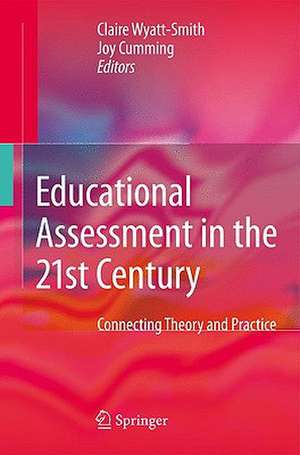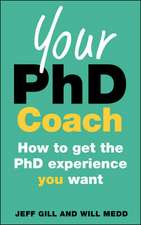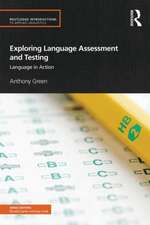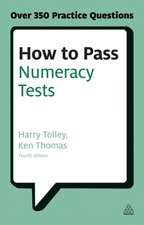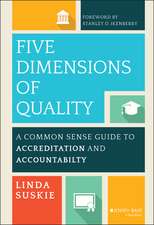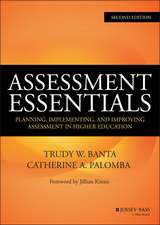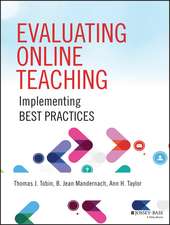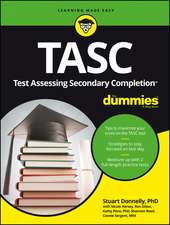Educational Assessment in the 21st Century: Connecting Theory and Practice
Editat de Claire Wyatt-Smith, Joy Cummingen Limba Engleză Hardback – 9 iun 2009
| Toate formatele și edițiile | Preț | Express |
|---|---|---|
| Paperback (1) | 946.41 lei 43-57 zile | |
| SPRINGER NETHERLANDS – 19 oct 2010 | 946.41 lei 43-57 zile | |
| Hardback (1) | 952.40 lei 43-57 zile | |
| SPRINGER NETHERLANDS – 9 iun 2009 | 952.40 lei 43-57 zile |
Preț: 952.40 lei
Preț vechi: 1161.47 lei
-18% Nou
Puncte Express: 1429
Preț estimativ în valută:
182.27€ • 189.58$ • 150.47£
182.27€ • 189.58$ • 150.47£
Carte tipărită la comandă
Livrare economică 14-28 aprilie
Preluare comenzi: 021 569.72.76
Specificații
ISBN-13: 9781402099632
ISBN-10: 1402099630
Pagini: 336
Ilustrații: XXVI, 310 p.
Dimensiuni: 155 x 235 x 28 mm
Greutate: 0.64 kg
Ediția:2009
Editura: SPRINGER NETHERLANDS
Colecția Springer
Locul publicării:Dordrecht, Netherlands
ISBN-10: 1402099630
Pagini: 336
Ilustrații: XXVI, 310 p.
Dimensiuni: 155 x 235 x 28 mm
Greutate: 0.64 kg
Ediția:2009
Editura: SPRINGER NETHERLANDS
Colecția Springer
Locul publicării:Dordrecht, Netherlands
Public țintă
ResearchCuprins
Framing Assessment Today for the Future: Issues and Challenges.- Framing Assessment Today for the Future: Issues and Challenges.- Creativity and Innovation in Assessment: New Skills and Capabilities, and Changing Communication Practices.- Assessment in the Perspective of a Social Semiotic Theory of Multimodal Teaching and Learning.- Transforming K–12 Assessment: Integrating Accountability Testing, Formative Assessment and Professional Support.- Assessment Issues and New Technologies: ePortfolio Possibilities.- Towards Theorising Assessment as Critical Inquiry.- Building Social Capital: Difference, Diversity and Social Inclusion.- Fairness in Assessment.- Assessment, Gender and In/Equity.- Assessment, Disability, Student Engagement and Responses to Intervention.- Assessment Challenges, the Law and the Future.- Assessment in a Context: Geography, Policy and Practice.- Teachers’ Use of Assessment Data.- A Problematic Leap in the Use of Test Data: From Performance to Inference.- Educational Assessment in Norway—A Time of Change.- Articulating Tacit Knowledge Through Analyses of Recordings: Implications for Competency Assessment in the Vocational Education and Training Sector.- Defining Standards for the 21st Century.
Textul de pe ultima copertă
Even in the white heat of the ever-present education debate, assessment is one of the hottest and most contested topics. While teachers develop practical methodologies such as Assessment for Learning, that aim to bring positive benefits to learners, governments and policy-makers strengthen the role of externally mandated assessment for accountability purposes.
With the field of assessment a key focus for research the world over, the traditional issues of the topic, such as validity and reliability, have been joined by a host of other issues all pressing for attention. These include: the value of testing for international benchmarking and public reporting; taking account of cultural and social diversity; new modes of testing and assessment; technological innovation; the issue of what counts as authentic assessment; and inclusion and disability issues in assessment.
In their preface, the editors argue that in a post-modern world changes in the nature of work, globalization, the information revolution and today’s social challenges will all impact on educational priorities, and thus will require new modes of assessment. As our faith in the sciences to solve our problems erodes, we also recognize that the educational assessment cannot be an exact science either; that the involvement of human beings in every aspect of its design, execution and use makes it irrevocably a social project and thus subject to all the vagaries that any kind of human activity implies. This has led to the beginnings of a more humanistic approach to assessment.
As this book makes clear, the challenge for assessment in the 21st century will be to reflect these newly emerging educational priorities. Assessment procedures will be needed that support the next generation in acquiring the skills and values they will need to manage emerging global challenges, skills such as teamwork, problem-solving and the ability to manage one’s ownlearning. The contributors here offer hope, suggesting that after more than a century of modernist-inspired educational assessment practices inimical to the issues of utility, fairness, flexibility and relevance, we may well be standing at the threshold of significant change.
With the field of assessment a key focus for research the world over, the traditional issues of the topic, such as validity and reliability, have been joined by a host of other issues all pressing for attention. These include: the value of testing for international benchmarking and public reporting; taking account of cultural and social diversity; new modes of testing and assessment; technological innovation; the issue of what counts as authentic assessment; and inclusion and disability issues in assessment.
In their preface, the editors argue that in a post-modern world changes in the nature of work, globalization, the information revolution and today’s social challenges will all impact on educational priorities, and thus will require new modes of assessment. As our faith in the sciences to solve our problems erodes, we also recognize that the educational assessment cannot be an exact science either; that the involvement of human beings in every aspect of its design, execution and use makes it irrevocably a social project and thus subject to all the vagaries that any kind of human activity implies. This has led to the beginnings of a more humanistic approach to assessment.
As this book makes clear, the challenge for assessment in the 21st century will be to reflect these newly emerging educational priorities. Assessment procedures will be needed that support the next generation in acquiring the skills and values they will need to manage emerging global challenges, skills such as teamwork, problem-solving and the ability to manage one’s ownlearning. The contributors here offer hope, suggesting that after more than a century of modernist-inspired educational assessment practices inimical to the issues of utility, fairness, flexibility and relevance, we may well be standing at the threshold of significant change.
Caracteristici
A host of internationally recognized authors explore the latest ideas on the future of assessment Provides readers with a range of theoretical and methodological viewpoints Includes an explanation of the authors’ frameworks to enhance both knowledge of different theories and understanding of viewpoints Up-to-date and forward-thinking, reflecting newly emerging educational priorities Practical and applicable to teaching practice
